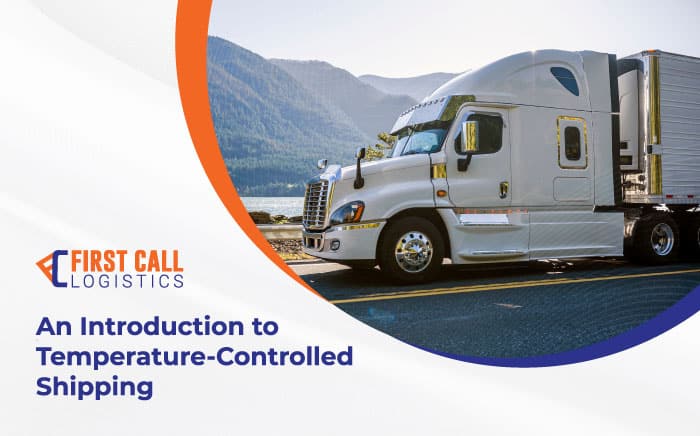An Introduction to Temperature-Controlled Shipping

While the world of shipping may seem pretty straightforward, there are many products that need special protection from the elements. Many companies turn to temperature-controlled shipping, including refrigerated trucks, as the solution. This article explains what temperature-controlled shipping is and how it benefits a vast array of businesses.
What Is Temperature-Controlled Shipping?
Refrigerated shipping (also referred to as “reefer”) is the most widely used type of temperature-controlled shipping. It is a specialized means of transportation for products, such as food and pharmaceuticals, that require refrigeration for protection from heat and humidity. Trailers hauling these loads have built-in refrigeration systems to maintain the pre-shipped state of a product.
Reefer trailers require multiple components for optimal temperature control. They need insulation, a calibrated thermostat, a refrigeration unit and fan, as well as an air delivery duct. Doors also need to seal tightly when closed and be free of cracks and holes.
Additional methods for controlling the climate of trailers include insulated packaging and cooling elements within a trailer. These elements can include dry ice, ice packs, and air circulation. Air-moisture regulation technology controls the humidity within a trailer.
Keeping up a fleet of reefer trailers can be costly because they don’t last as long as other trailers. Businesses not wishing to invest in maintaining a fleet of reefer trailers benefit from using a third-party logistics company (3PL). Typically, these companies have temperature-controlled shipping options and the expertise to maintain them.
Benefits of Temperature-Controlled Shipping
Temperature-controlled shipping using reefer trailers has several benefits. The main one is that it prevents spoilage. Many products can be damaged by temperature change, uncontrollable weather conditions, and even humidity. Reefer trailers allow control over the supply chain to preserve products at their peak condition.
A variety of products can be transported using temperature-controlled trailers including:
- Produce – Most produce will wilt or ripen too quickly if shipped without proper refrigeration. Ripening fruit can heat up normal trailers, causing them to spoil faster than they would in reefer trailers.
- Animal products – Whether frozen or refrigerated, animal products require temperature-controlled shipping. Products like meat, eggs, and dairy are preserved best at specific temperatures. Work with your 3PL to determine the best temperature for your product.
- Pharmaceuticals – Many pharmaceutical products, including the COVID-19 vaccines, require refrigeration or freezing at specific temperatures to be usable by patients and health professionals. Temperature variation can be hazardous.
- Beauty products – Like pharmaceuticals, beauty products can go bad if heated beyond safe temperatures.
- Flowers – While flowers are similar to produce in their need for refrigeration, different flowers thrive at different temperatures and levels of humidity. Improper shipping conditions could cause them to wilt or rot.
- Candles – Put simply, if candles aren’t refrigerated, they can melt in conventional trailers.
Temperature-controlled shipping is useful year-round. In hot weather, reefer trailers prevent products from melting, ripening, or otherwise spoiling. Likewise, in colder times of the year, temperature-controlled trailers can keep products from freezing.
Best Practices for Temperature-Controlled Shipping
Temperature-controlled shipping is more complex than the wider truckload market, so it will be helpful to talk to your 3PL specialist about your specific concerns.
The work of temperature-controlled shipping can start before products are loaded onto a reefer trailer. Some products, such as frozen foods, may need to be loaded onto a pre-chilled trailer. Keeping temperatures as constant as possible helps prevent spoilage.
Work with your third-party logistics specialist to determine the best type of reefer trailer for your product. Reefer trailers can be refrigerated either through cycle or continuous air. Cycled air runs periodically. This saves diesel (and money), but it creates variation in temperature. Continuous cooling works best for heat-sensitive cargo, such as ripening produce.
Even the way cargo is loaded can affect temperature control. Produce, for example, needs to be stacked so that air can circulate between boxes throughout the truckload. Your 3PL can work with you to determine the best stacking pattern for your products.
Temperature-controlled shipping definitely requires some planning and forethought because of fluctuations in the market in alignment with produce harvests. In March each year, produce volumes increase from the southern U.S. The harvest puts produce shippers on a timeline to get their products from the farm to the store shelves. Anyone using reefer trailers should keep this in mind since it will affect availability.
Businesses with specialized products can benefit greatly from temperature-controlled shipping. The ability to adjust for specific temperatures and humidity levels allows for companies to extend the life of products from produce to pharmaceuticals. There are many options from heating to cooling with reefer trailers. Working with an experienced third-party logistics provider is the best way to determine how your business can benefit from temperature-controlled shipping.
First Call Logistics: Proudly Specializing in Temperature-Controlled Shipping since 2005
Did you know that First Call Logistics has specialized in temperature-controlled freight delivery since 2005? To learn more about our temp.-controlled services, contact us today.
Simplify your Next Shipment with First Call Logistics
Building and managing cost-efficient supply chains is a full-time job. First Call’s rare combination of in-house assets, expert problem-solving and track record of stellar customer service makes us the 3PL of choice for business partners with a wide range of shipping needs.